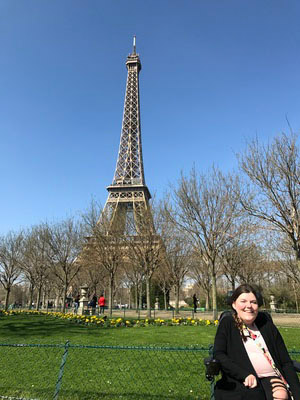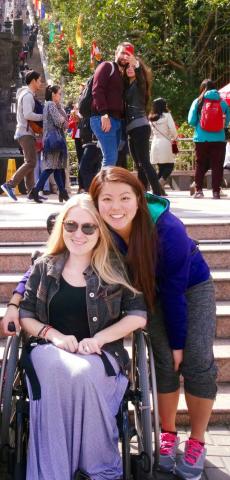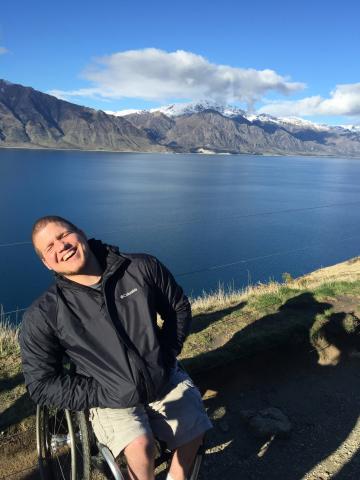
Leveling the Field, Here and Abroad
Division of Disability Resources & Educational Services
Since 1948, the Division of Disability Resources and Educational Services (DRES) has worked to ensure that students with disabilities have equal access to all of the resources, programs, and activities offered at the University of Illinois at Urbana-Champaign, access, in other words, to the full student experience. For a large number of students at Illinois, that experience includes studying abroad. The university offers more than 300 study abroad opportunities through its various units, ranging from winter and spring break trips to academic year options.
Research cited by NAFSA: Association of International Educators shows that studying abroad improves grade point averages, fosters intercultural understanding, and increases employability, among other things. DRES has been helping students with disabilities to access this aspect of the student experience since the 1960s. Susann Sears, formerly an access specialist with DRES, says this is in keeping with the philosophical underpinnings of DRES.
Is It Feasible?
“At DRES, we constantly strive to go above and beyond what the law requires to provide services to students with disabilities,” said Ms. Sears, who is now the director of Beckwith Residential Support Services, a program for students with physical disabilities who require assistance in performing the tasks of daily living. “By collaborating with the campus and with faculty leading study abroad programs, we are able to make studying abroad accessible to registered DRES students.”
She points out that even though students with disabilities pay tuition and participate in University of Illinois-sponsored study abroad programs, the Americans with Disabilities Act does not guarantee their right to access in countries other than the United States. So each program in which students with disabilities express interest must be researched thoroughly to make sure their participation is feasible.
“For example, if the essential requirements of a program include traveling between locations by bus, subway, or train, are those vehicles and stations going to be accessible to individuals in wheelchairs?” she said. “Students with non- visible disabilities, such as depression or anxiety, may require counseling support above and beyond other program participants. Are these services available? Are these diagnoses even recognized in the host country? We try to go over questions related to a selected study abroad opportunity exhaustively to minimize surprises.”
NOW THAT I KNOW I CAN TRAVEL, IT WILL OPEN UP OPPORTUNITIES FOR ME IN THE FUTURE. –CHELSEY
Dealing With Challenges
 The conditions in the host country aren’t the only issue of concern to students with disabilities. The prospect of flying can itself be daunting. Chelsey Baker, a junior in Special Education, joined a nine-day spring break trip to France that focused on the French system of education. She recalls how her excitement about going abroad was tempered by her nervousness about flying.
The conditions in the host country aren’t the only issue of concern to students with disabilities. The prospect of flying can itself be daunting. Chelsey Baker, a junior in Special Education, joined a nine-day spring break trip to France that focused on the French system of education. She recalls how her excitement about going abroad was tempered by her nervousness about flying.
“Prior to studying abroad, I had never been on an airplane. Getting on a plane might seem like one of the simpler aspects of going abroad, but I had heard a lot of stories about wheelchairs being damaged on flights and bad experiences traveling with medical equipment,” she said. She uses a power chair, which can cost upwards of $30,000.
Her chair survived the fight. On the first day in France, however, she “fried” the power converter she was using to charge the chair. “The incompatibility of power in foreign countries with power chairs is one of the biggest issues we’ve heard about from our students,” said Ms. Sears. “In some countries, you can’t use a power chair at all and have to have someone push you around in a manual chair.” In Chelsey’s case, she and the trip organizers were able to locate a French wheelchair charger that didn’t need a power adapter.
 TRAVELING REALLY CHANGES YOU. YOU SEE A WHOLE OTHER WORLD AND EXPERIENCE SOMETHING
TRAVELING REALLY CHANGES YOU. YOU SEE A WHOLE OTHER WORLD AND EXPERIENCE SOMETHING
BEAUTIFUL. –AMELIA
Students who use power chairs typically have physical disabilities that prevent them from performing the tasks of daily living without assistance. Requiring a personal assistant can be another obstacle to traveling abroad. It was one of the biggest for Amelia O’Hare, a senior in urban planning and community development who went on a winter break trip to Hong Kong and Taiwan to study their resources for people with disabilities.
“Having to pay for a personal assistant to accompany me was the biggest obstacle I faced,” she said. “Susann [Sears] helped me apply for an Enabled Abroad Scholarship, which was amazingly helpful.” The scholarship is available to students who can demonstrate that they have costs associated with studying abroad that exceed the typical costs of the program in which they are participating.
Amelia’a destinations didn’t support power chairs, so her personal assistant had to help her not only with activities of daily living but with getting around in a manual wheelchair. A previous travel experience in Europe hadn’t prepared her for the level of inaccessibility she encountered in Hong Kong and Taiwan. “In Hong Kong, it was difficult to get around and even to get inside buildings. We found a way, but there were a lot of obstacles,” she said.
AT TIMES YOU MIGHT THINK, WHY AM I DOING THIS? WHY AM I STUCK IN THE MUD MILES AND MILES FROM HOME? BUT IN THE END, IT’S SO WORTH IT. –TIM
Do It!
 For some students, the educational purpose of the trip itself can be one of the biggest obstacles to address. Tim Nagel, now a graduate student in Recreation, Sport and Tourism, hoped to join a summer program in New Zealand. As an undergraduate, he was a member of the wheelchair basketball team, so traveling during the academic year was not feasible. The potential problem was that the trip focused on adventure tourism.
For some students, the educational purpose of the trip itself can be one of the biggest obstacles to address. Tim Nagel, now a graduate student in Recreation, Sport and Tourism, hoped to join a summer program in New Zealand. As an undergraduate, he was a member of the wheelchair basketball team, so traveling during the academic year was not feasible. The potential problem was that the trip focused on adventure tourism.
“It involved a lot of activities I can’t do, such as hiking, climbing, going on rough trails,” he said. “Initially, I was hesitant to pursue it because I thought it would be impossible.”
He met with Ms. Sears, RST department head Laurence Chalip, and RST professor Jon Welty Peachey, the faculty advisor on the trip, anticipating disappointment. Instead, he found that much thought had already been given to alternative activities that he could do. “That’s when I thought, ‘Wow, they really want me to be able to go.’ After that meeting, I really thought this was a trip I could do,” he said.
He, Chelsey Baker, and Amelia O’Hare all describe their study abroad experiences as “amazing.” Each encountered challenges that tested their resourcefulness and perseverance, but each took away greater confidence in their abilities to overcome obstacles and broaden their life experiences. Each was grateful to start their trips with the support of DRES behind them. And each shared the same advice with other students with disabilities who think they might want to study abroad: start planning early, work with the right people, go for it, and have a great time!
